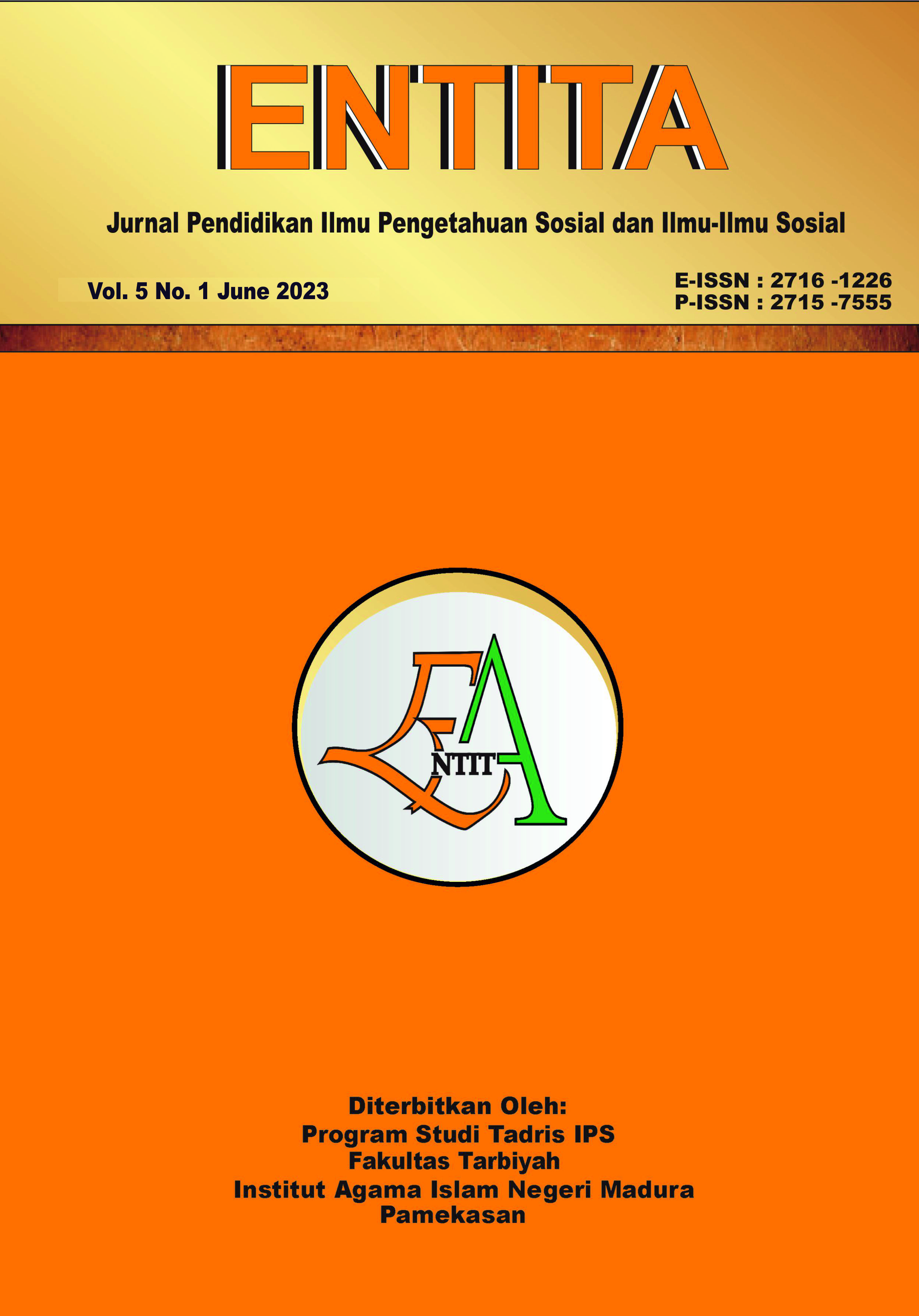Progressive Commodification of Pancasila Values In Schools: Study of The Implications of Implementing P5 by IPS Teachers
 Abstract views: 204
,
Abstract views: 204
,
 PDF downloads: 184
PDF downloads: 184
Abstract
The profile of Pancasila students is the government's effort to create national character through educational aspects. This strategy realizes the achievement of national education goals, namely to create a nation that has Pancasila character. In forming the character profile of Pancasila students, the role of a teacher, especially social studies teachers, is needed. In forming the character profile of Pancasila students, the role of a teacher, especially social studies teachers, is needed. The purpose of this study was to find out how far the role of the social studies teacher plays in shaping the character of students based on the Pancasila student profile in social studies subjects in driving madrasas. This study uses a qualitative method. The research location is MAN 1 Probolinggo. The sample in this study included madrasa heads, social studies teachers, and curriculum assistants. Collection techniques used interviews, observation, and documentation. Furthermore, the process of testing the validity of the researcher's data used two techniques, namely source triangulation techniques and theoretical triangulation techniques. The results and conclusions, namely social studies teachers in forming a Pancasila student profile at MAN 1 Probolinggo includeFirst, teacher as role model,second, teacher as a motivator,third, teacher as a facilitator, as well fourth, the teacher as evaluator. As for the Pancasila values formed by social studies teachers, there are six indicators of themFirst , have faith, betaqwa to God Almighty, and have good morals.Second, gotomg royomg. Third, berbhineka global. Fourth, independent.Fifth, critical reasoning. As well assixth, creative. The role of the teacher in shaping the profile of Pancasila students has a relevance to Vygotsky's contrutivistic learning theory, in this theory the role of the teacher is related to shaping the character of students. There are inhibiting factors experienced by IPS teachers in forming Pancasila student profiles including the lack of support from parents of students and the lack of maximum performance of IPS teachers in forming Pancasila student profiles.
Downloads
References
Chang, H. (2022). The longitudinal transition of the moral character latent profile of elementary school students and predictive factor verification in Korea. Acta Psychologica, 230(March), 103710. https://doi.org/10.1016/j.actpsy.2022.103710
Dafitri, R. S., Rafni, A., & Bakhtiar, Y. (2022). Implementasi Program Merdeka Belajar melalui Profil Pelajar Pancasila di SMKN 1 Sijunjung.
Desi Rahmatika1*, Muriani2, M. S. (2022). Peran Guru Dalam Memberikan Motivasi Dalam Penerapan Kurikulum. Jurnal Pendidikan Dan Ilmu Sosial, 1(4).
Hastangka, B. (2023). Profil Pelajar Pancasila : Code of Conducts , for Indonesian Students ? (Vol. 1). Atlantis Press SARL. https://doi.org/10.2991/978-2-494069-39-8
Ji, P., DuBois, D. L., & Flay, B. R. (2021). Social-emotional and character development scale: Validation with urban middle school students. Children and Youth Services Review, 127(June), 106124. https://doi.org/10.1016/j.childyouth.2021.106124
Khairi Wilda Prihati, M.Salam, R. D. (2021). The role of students in building a nation based on Pancasila. 2(1), 18–22.
Kunarsih, S. R. I., & Adlina, Z. (2021). IMPLEMENTATION OF PANCASILA VALUES IN PANCASILA STUDIES COURSE ON BUILDING CHARACTER. 50–60. https://doi.org/10.30546/2616-4418.19.2021.50
Lee, C. J., Huang, J., Religious, C., Education, S., Education, T., Kong, H., & R, H. K. S. A. (2021). The relations between students ’ sense of school belonging , perceptions of school kindness and character strength of kindness. Journal of School Psychology, 84(May 2019), 95–108. https://doi.org/10.1016/j.jsp.2020.12.001
Martanti, F., Widodo, J., Rusdarti, R., & Priyanto, A. S. (2021). Penguatan Profil Pelajar Pancasila Melalui Pembelajaran Diferensiasi Pada Mata Pelajaran IPS di Sekolah Penggerak. 412–417.
Megawati, R., & Ningsih, T. (2020). Pembentukan Karakter melalui Pembelajaran Ilmu Pengetahuan Sosial (IPS). Jurnal Pendidikan, 8(2), 249–263.
Muzakkir, Hussin, Z., Razak, R. A., & Munir, A. (2022). The dataset for validation of factors affecting teachers’ decision to integrate character values into curriculum. Data in Brief, 43, 108404. https://doi.org/10.1016/j.dib.2022.108404
Prayitno, H. J., Markhamah, Nasucha, Y., Huda, M., Ratih, K., Ubaidullah, Rohmadi, M., Boeriswati, E., & Thambu, N. (2022). Prophetic educational values in the Indonesian language textbook: pillars of positive politeness and character education. Heliyon, 8(8), e10016. https://doi.org/10.1016/j.heliyon.2022.e10016
Rizkasari, E. (2020). THE ROLE OF ELEMENTARY SCHOOL TEACHERS IN PREPARING THE.
Setiawan, K. U. (2020). Pancasila dan Indonesia di Era Disrupsi. 404(Icossei 2019), 14–19.
Suherman, A., Melati, P., Darojat, A., & Rosita, N. (2021). Application of Pancasila Student Profiles by Citizenship Education Teachers as an Effort to Realize National Character. 02(July), 85–96.
Tadege, A., Seifu, A., & Melese, S. (2022). Teachers’ views on values-education: The case of secondary schools in East Gojjam, Ethiopia. Social Sciences & Humanities Open, 6(1), 100284. https://doi.org/10.1016/j.ssaho.2022.100284
Winarsih, Nining, sofia salsabila. (2022). The Phenomenon Of Internet Adiction Disorder Online Gambling In Probolinggo. 4(2).
Yayang, O., & Sudigdo, A. (2022). Profile of Pancasila Students : Implementation of Diversity in MBKM Student ’ s Stories in UST Yogyakarta. 2(2).
Copyright (c) 2023 ENTITA: Jurnal Pendidikan Ilmu Pengetahuan Sosial dan Ilmu-Ilmu Sosial

This work is licensed under a Creative Commons Attribution-NonCommercial 4.0 International License.
ENTITA: Jurnal Pendidikan Ilmu Pengetahuan Sosial dan Ilmu-Ilmu Sosial operates an Open Access policy under a Creative Commons Non-Commercial 4.0 International license. Authors who publish with this journal agree to the following terms:
- The copyright of the received article once accepted for publication shall be assigned to the journal as the publisher with licensed under a

- Journal is able to enter into separate, additional contractual arrangements for the non-exclusive distribution of the journal's published version of the work (e.g., post it to an institutional repository or publish it in a book), with an acknowledgement of its initial publication in this journal.
- Journal is permitted and encouraged to post their work online (e.g., in institutional repositories or on their website) prior to and during the submission process, as it can lead to productive exchanges, as well as earlier and greater citation of published work (see The Effect of Open Access).
- Here is Copyright Transfer Form that author can download and send to OJS during submission.

















